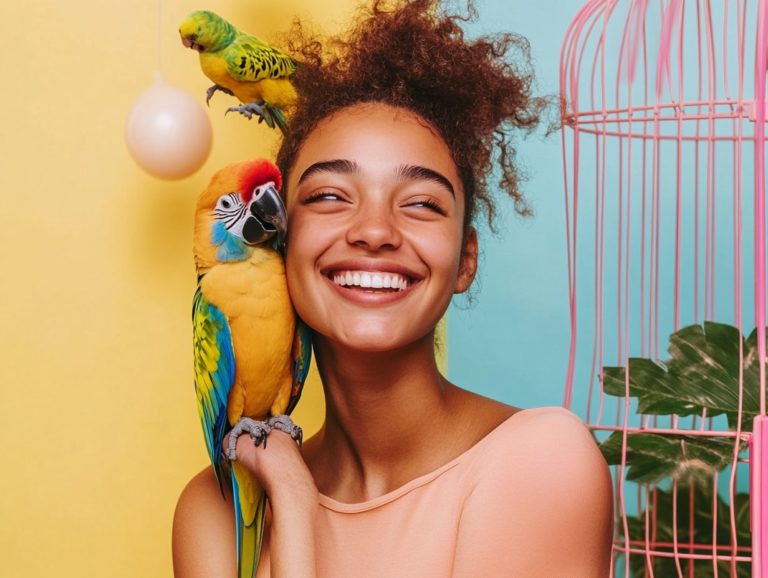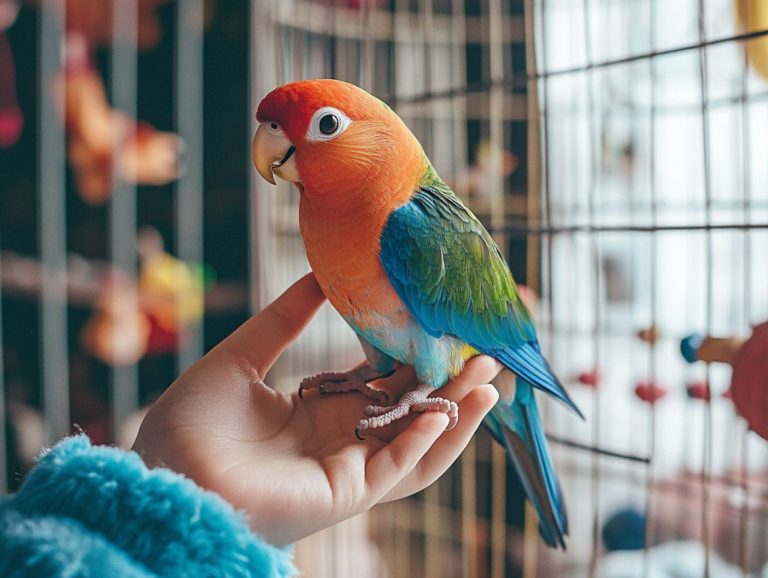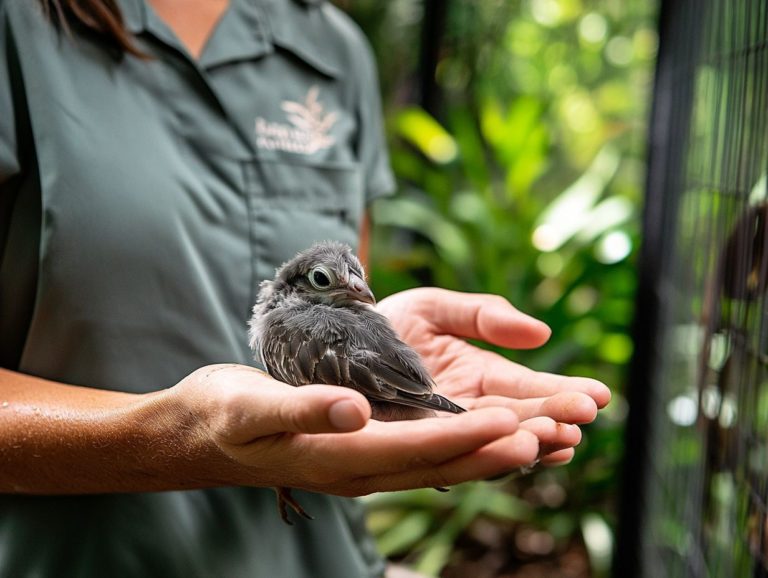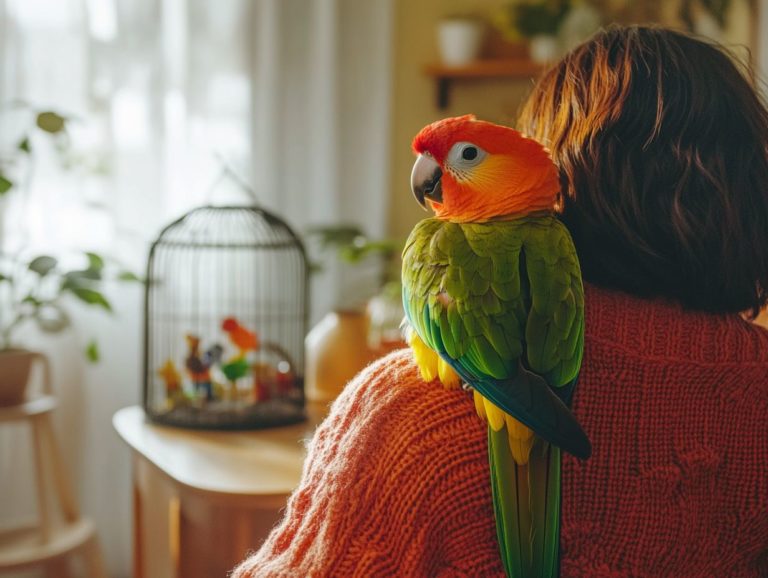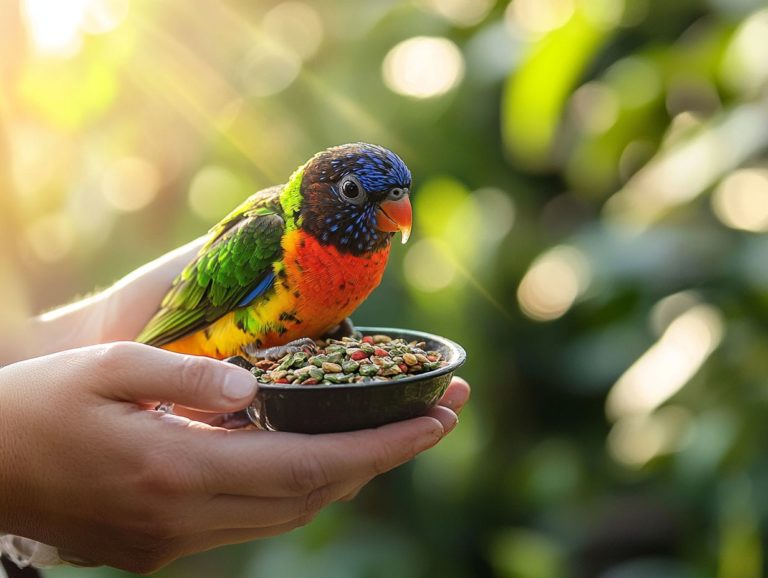How to Identify a Healthy Bird for Adoption
Considering welcoming a feathered friend into your home? Adopting a bird can be a rewarding journey, providing companionship, entertainment, and a unique bond that only an avian pet can offer.
Before you dive in, it s crucial to reflect on various factors from assessing your lifestyle to identifying a healthy bird.
Get ready to discover everything you need to know about the benefits of bird adoption, what to look for in your potential pet, and how to prepare your home for your new avian companion!
Contents
- Key Takeaways:
- Why Adopt a Bird?
- Factors to Consider Before Adopting a Bird
- Identifying a Healthy Bird
- Questions to Ask the Adoption Center
- Preparing for Your New Bird
- Frequently Asked Questions
- How to Spot a Healthy Bird Before You Adopt!
- Can I adopt a bird that is currently on medication?
- Should I ask for a health certificate when adopting a bird?
- Red Flags When Identifying a Healthy Bird
- Is it important to know the bird’s diet before adopting?
- What should I do if I suspect the bird I am interested in adopting is not healthy?
Key Takeaways:
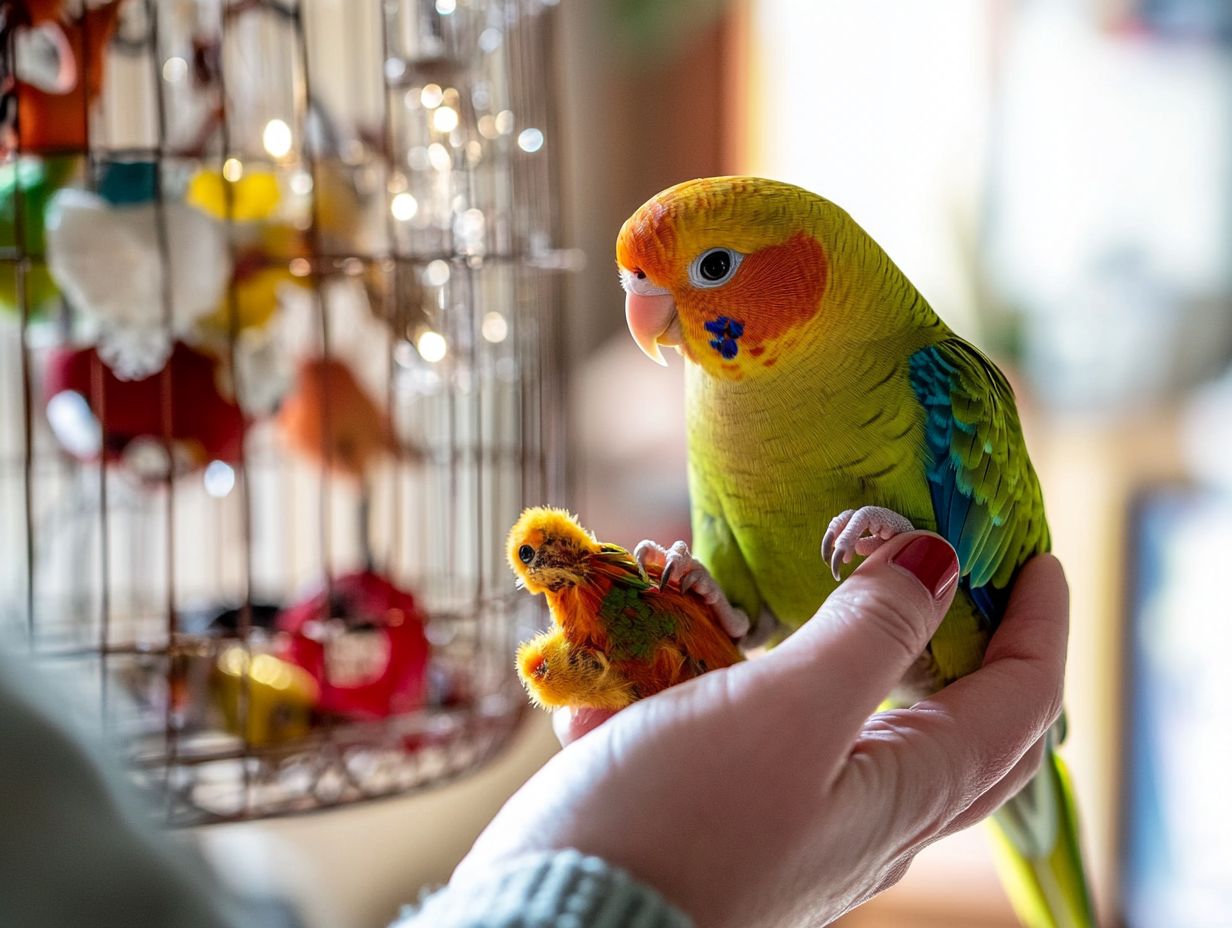
- Identify healthy birds by checking their physical and behavioral indicators.
- Assess your lifestyle and resources before adopting to ensure you can provide proper care.
- Gather important information and ask questions at the adoption center to ensure the well-being of your new bird.
Why Adopt a Bird?
Adopting a bird presents a remarkable opportunity to embrace the role of a responsible pet owner while enriching the lives of both you and your feathery companion. Birds whether they re vibrant macaws, charming cockatoos, affectionate lovebirds, or lively parakeets bring joy and companionship into your home.
By prioritizing care from a pet doctor and regular checkups, you can ensure your bird enjoys optimal health. Offering a caring home makes a significant difference for a creature that might otherwise languish in a shelter, positively impacting animal welfare and enhancing the overall well-being of pet birds.
Benefits of Adopting a Bird
Adopting a bird brings a wealth of benefits that can truly enhance your life, offering companionship, emotional support, and the unique joy of nurturing a living creature.
By observing a bird’s behavior and appearance, you can gain valuable insights into its health, enabling you to spot potential issues before they escalate. The vibrant presence of these delightful pets can lift your spirits; their playful antics and melodious songs bring laughter and joy to your home.
Caring for a bird involves regular interaction, allowing you to establish a routine that nurtures a close bond between you and your pet. This enriching relationship offers profound emotional rewards, as everyday moments of connection can significantly enhance your mental well-being and elevate your overall life experience.
Factors to Consider Before Adopting a Bird
Before adopting a bird, it’s essential to evaluate your lifestyle and resources to ensure you can provide the care that a healthy bird deserves. Understanding the lifecycle of adopted birds will help you recognize that each species, be it cockatiels, macaws, or parakeets, has specific needs regarding diet, space, and social interaction, which can vary greatly.
Consider the time and financial commitment you re prepared to make; these factors are crucial for maintaining your bird s health. Recognizing the importance of regular checkups and being vigilant for signs of illness, such as weight loss and open-mouth breathing, will significantly influence your feathered companion’s long-term well-being.
Assessing Your Lifestyle and Resources
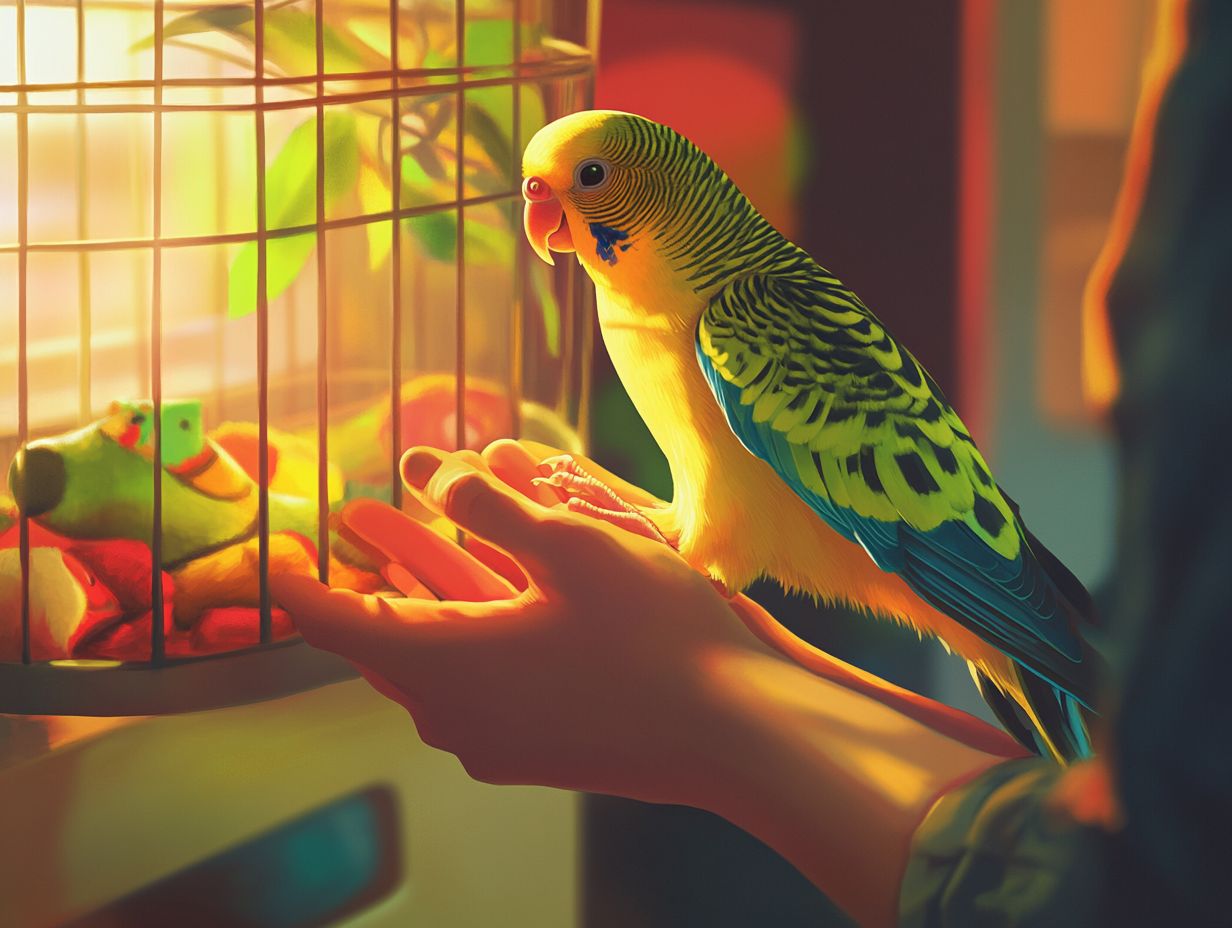
Assessing your lifestyle and resources is crucial when contemplating bird adoption, ensuring you’re fully equipped to meet your avian companion’s unique needs. Understanding what happens to rescued birds after adoption can also help inform your decision.
To provide a healthy and happy life for these feathered friends, take a candid look at your available time, financial resources, and commitment levels. Birds thrive on daily attention, companionship, and mental stimulation, so if your schedule is packed, it might be worth reconsidering the decision to adopt. Additionally, you can learn how to support bird adoption through donations to help those in need.
The costs associated with high-quality bird food, toys, and routine care from a pet doctor can accumulate significantly over time, making it essential to establish a budget from the outset. Crafting an enriching environment filled with engaging activities, perches, and social interaction is vital for promoting overall bird health and well-being, ensuring these vibrant creatures flourish in their new homes.
Ready to welcome a feathered friend? Begin your journey to bird adoption today!
Identifying a Healthy Bird
Identifying a healthy bird is essential for ensuring that your new pet flourishes in its new environment. A healthy bird showcases clear signs of vitality, such as vibrant plumage, normal droppings, and an active demeanor. By understanding bird adoption and these indicators, you can detect potential health issues before they escalate.
Be on the lookout for common signs of illness. Changes in behavior or appearance, such as lethargy or open-mouth breathing, are critical to note. This knowledge is crucial for you as a new bird owner. It enables you to seek timely care from a board-certified avian vet, ensuring that your feathered companion receives the appropriate first aid when it’s needed.
Physical and Behavioral Indicators
Recognizing the physical and behavioral indicators of a healthy bird is important for you as a bird owner and for ensuring your feathered friend’s well-being.
Paying attention to details like the quality of their feathers is vital; they should be vibrant and smooth, not dull or ragged, as this serves as a key marker of overall health. Monitoring droppings is equally important; healthy droppings are typically firm and well-formed in color, while any abnormalities could signal dietary issues or illness.
Body posture also provides valuable insights; a healthy bird often stands upright and actively engages with its environment. Behavioral signs, such as energy levels and interactions with you, can illuminate their emotional state. A content bird is likely to chirp, engage, and display curiosity, underscoring the importance of regular veterinary check-ups to maintain their health and happiness.
Questions to Ask the Adoption Center
When contemplating the adoption of a bird, it’s essential to pose the right questions at the adoption center to gain insight into your potential new pet’s background and health status. Engaging thoughtfully with the staff allows you to delve into the bird’s history, any past health issues, and whether there are documented health records. Understanding the bird adoption process can further enhance your experience.
Gathering this information can prepare you for potential challenges, laying the groundwork for effective veterinary care. Furthermore, comprehending the bird’s behavior and temperament is crucial in determining whether the benefits of adopting older birds align with your lifestyle and household dynamics.
Gathering Important Information

Gathering essential information about a bird before adoption is crucial for making informed decisions regarding its care and smooth adjustment into your home, including its dietary needs and prior health issues. Understanding the process of fostering birds for adoption can provide valuable insights in this journey.
This data collection should encompass detailed health records, offering insights into any past medical issues, vaccinations, or treatments. Understanding behavioral traits is equally vital, as it aids in predicting how the bird might adapt to its new environment and interact with your family members. Being aware of previous care routines can provide significant insights into its dietary preferences and social needs.
All of this information is pivotal in establishing a solid foundation for veterinary care, ensuring that the bird receives timely medical attention and ongoing support to thrive in its new surroundings.
Preparing for Your New Bird
Get excited to prepare your home for your new feathered friend! Start by creating the perfect environment tailored to its specific needs while ensuring you have all the essential resources for proper care. Every species has its own unique habitat requirements, and understanding these is crucial to fostering a healthy and happy companion.
This involves offering suitable perches, engaging toys, and a balanced diet, along with ensuring that your home is a safe haven for your feathered friend.
Arranging a visit from a veterinarian can help you pinpoint potential hazards and establish a solid health routine for your new avian companion, ensuring you are prepared for any first aid situations that may arise.
Don’t wait! Start gathering everything you need today to welcome your new bird into a safe and loving home.
Creating a Suitable Environment
Creating the perfect environment for your new bird is essential for its overall well-being and happiness. A thoughtfully designed habitat nurtures both its physical and emotional health.
To accomplish this, consider several key elements that contribute to an ideal bird habitat. First and foremost, the cage size is crucial. It should be spacious enough for your bird to move freely, stretch its wings, and even practice short flights.
Next, think about perches made from natural wood in varying diameters. These not only provide comfort but also promote foot health, allowing your bird to thrive.
Incorporating a variety of stimulating toys is equally important. They keep your feathered friend engaged and encourage mental agility.
Lastly, don t underestimate the power of social interaction. Birds are inherently social creatures. Regular engagement with you can significantly enhance their emotional well-being, making them feel secure and loved.
Basic Care and Maintenance
Basic care and maintenance are crucial for ensuring the health and happiness of your new bird. Focus on diet, hygiene, and regular veterinary checkups.
Proper nutrition is the foundation of avian health. A well-balanced diet fuels energetic play, promotes vibrant feathers, and ensures longevity.
A clean home keeps your bird healthy and stress-free. Make it a priority to provide fresh water, monitor waste build-up, and clean the cage regularly to maintain hygiene.
Don’t wait! Schedule your bird’s vet appointment as soon as you bring them home. Routine visits to a bird doctor are vital for early detection of potential health issues, enabling timely interventions.
With these practices in place, you can cultivate an enriching and supportive habitat that truly fosters your bird’s well-being.
Frequently Asked Questions
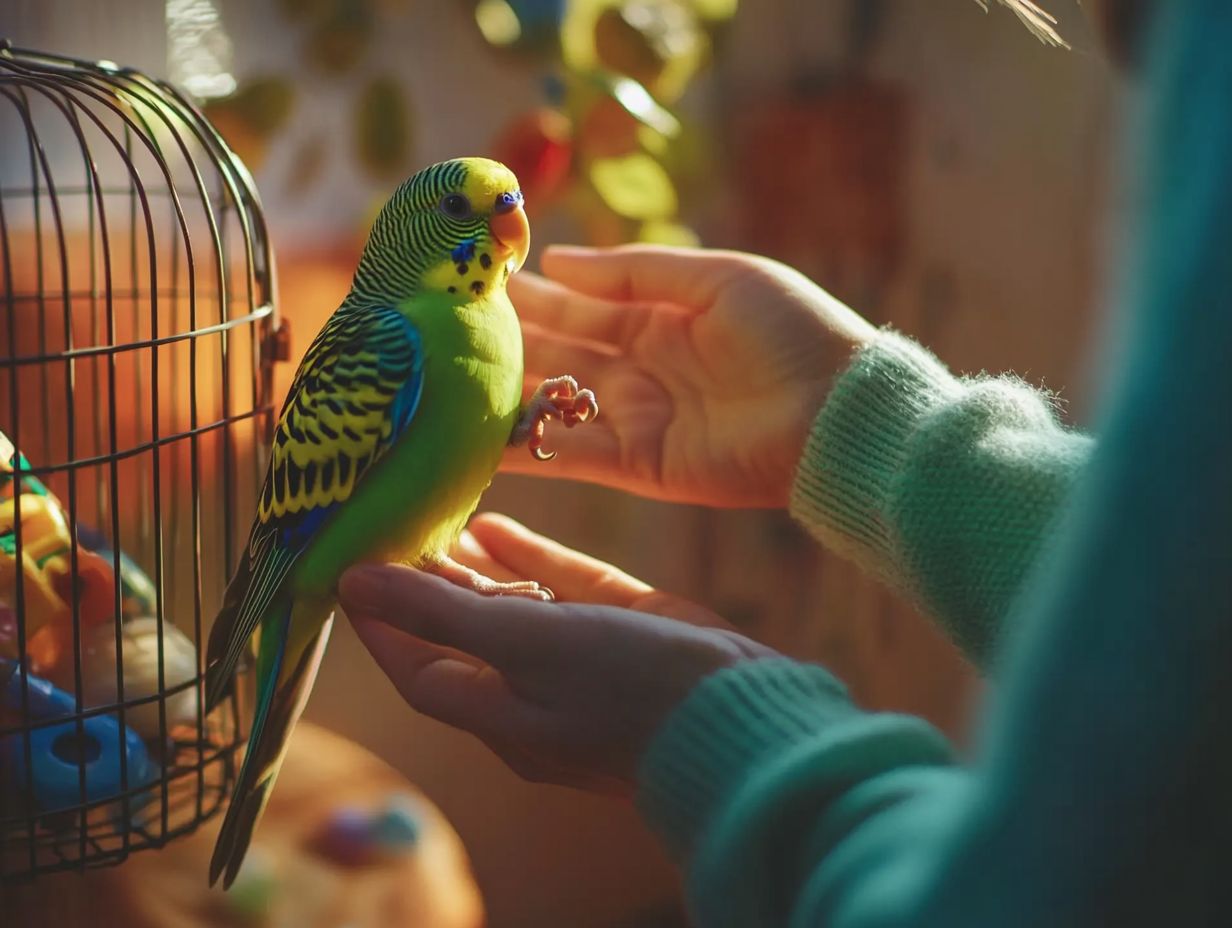
How to Spot a Healthy Bird Before You Adopt!
When identifying a healthy bird, consider these important factors:
- Shiny feathers
- Bright eyes
- Clean nostrils
- Active and alert behavior
- No signs of lethargy or aggression
Also, ask about the bird’s past medical history to ensure there are no underlying health issues.
Can I adopt a bird that is currently on medication?
It’s generally not recommended to adopt a bird on medication, as this may indicate ongoing health issues. However, if the medication is for a minor issue and the bird has been cleared by a veterinarian, it may still be suitable for adoption. For further guidance, check out local resources for bird adoption support.
Should I ask for a health certificate when adopting a bird?
Always ask for a health certificate when adopting your new feathered friend! This document provides crucial information about the bird’s medical history, including any previous illnesses or injuries. To ensure a smooth transition, you can also refer to how to prepare for bird adoption day and consider having a veterinarian perform a check-up before finalizing the adoption.
Red Flags When Identifying a Healthy Bird
Be on the lookout for these red flags:
- Discolored or unkempt feathers
- Discharge or crust around the eyes or nostrils
- Signs of respiratory distress
- A bird that is constantly fluffed up
- A bird sitting at the bottom of its cage
Is it important to know the bird’s diet before adopting?
Yes, knowing the bird’s diet is crucial. A healthy bird should have a varied and balanced diet consisting of pellets, fresh fruits and vegetables, and occasional treats suitable for species like macaws and cockatoos. Ask about the bird’s current diet and make any necessary adjustments gradually to avoid digestive issues.
What should I do if I suspect the bird I am interested in adopting is not healthy?
If you suspect the bird you want to adopt isn’t healthy, address your concerns with the adoption agency or previous owner. It’s crucial to ask for any available medical records and to understand what you should know about bird adoption.
Consider having a veterinarian examine the bird thoroughly. Being cautious is always better. Act now to ensure your new friend is healthy and happy!


